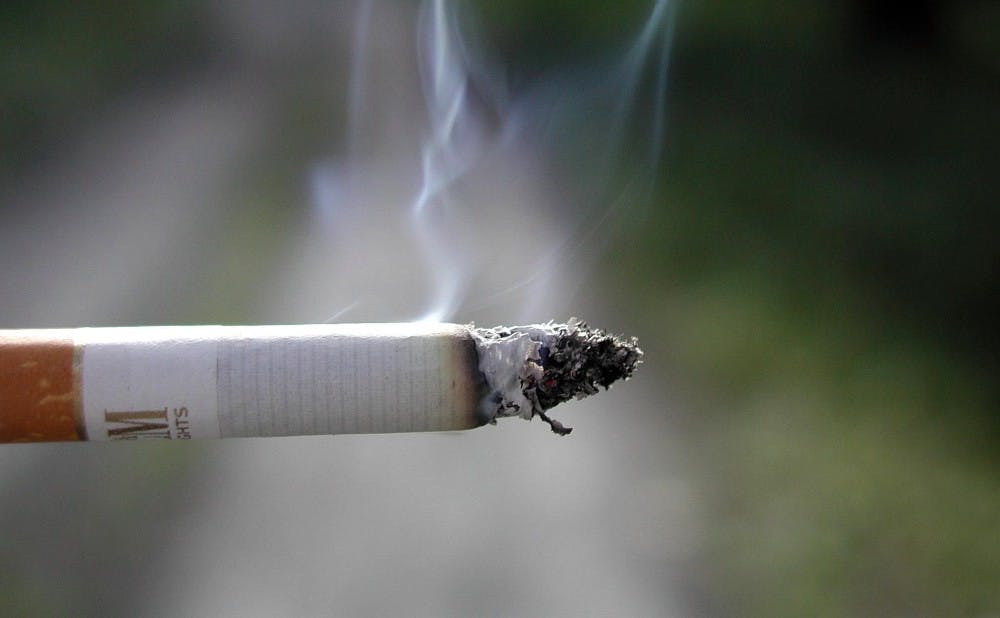Picture this. It’s a gorgeous fall day, and you’re walking across the quad enjoying the sunlight and breathing in the fresh air—until you walk right into a cloud of cigarette smoke.
The Duke Smoke Free Initiative is working to make sure that never happens again. Led by the Duke Center for Smoking Cessation, the initiative is seeking support for a proposed policy that would ban all forms of combustible tobacco on campus but would still allow e-cigarettes and chewing tobacco.
“This is an opportunity to ensure that Duke students are not at a disadvantage with regards to their health,” said Walid Salah, a senior clinical research specialist and member of a working group for the initiative. “We’re invested in making sure Duke is developing future leaders of the world that are healthy and are able to live the full extent of their lives.”
The working group conducted a survey of 2,800 students and faculty that was presented at the Graduate and Professional Student Council meeting Oct. 17. It revealed that 11.4 percent of undergraduates, 7.9 percent of graduate students and 1.7 percent of faculty smoke cigarettes. Among international students, however, the rate was 15.6 percent.
In addition, the group’s recent review of research suggested that 67 percent of smokers will die of an illness caused by their smoking.
Junior Kushal Kadakia, executive vice president of Duke Student Government, explained that making Duke a smoke-free campus has been a DSG priority for many years. Last semester, DSG reached out to the Center for Smoking Cessation to begin gathering information about the Duke community’s thoughts on the proposed policy.
“This is not a one-shot, one-year project,” Kadakia said. “An initiative as big as this requires a lot of different input.”
In addition to their presentation to GPSC, the Center and DSG have met with student groups to get feedback and presented the idea last week at Fix My Duke, an annual forum that gathers input from presidents of living groups on campus.
Kadakia noted that more than 2,000 universities have already gone smoke-free, including the institutions that President Vincent Price and Chancellor for Health Affairs A. Eugene Washington previously worked at. However, the working group has not brought the idea to administrators yet.
“This isn't something that is new in higher education,” Kadakia said. “We would hope that advancing this policy would be of interest to them.”
The group has also conducted research on how other schools have enforced the smoking ban, but has not made any policy decisions on penalties for being caught smoking on campus. Studies have shown that simply having a policy in place can cut smoking rates considerably, Kadakia said.
Of particular interest is the international student population, which has higher smoking rates than the general undergraduate group. Salah, who is from Jordan and graduated from Duke in 2017, explained that in many other countries, smoking is a common practice.
“It’s like grabbing a beer with friends in U.S.,” he said. “Because it’s heavily embedded in the culture and social norms, there isn't a strong understanding of the extent to which smoking is a public hazard and a public health problem.”
Salah noted that even though there has been more information released about the dangers of smoking in the past 20 years, many places still continue the habit. Reducing the number of international smokers on campus is especially important to Salah because he doesn’t want the international community to face difficulties in life, he said. Studies have shown that smokers are less likely to be hired than nonsmokers.
“I don't want the international community to be at a disadvantage in the job market,” he said.
Despite the higher percentage of smoking among international students, Salah noted that when he met with the leaders of various international groups, they were very supportive of the proposed ban.
This week, the working group will issue a joint resolution during the DSG and GPSC meetings in hopes of getting ratification from their respective legislative bodies. This will serve as a formal statement of student support that they can use to have conversations with University leaders.
Kadakia noted that since Durham bans smoking in its recreational facilities, bus stops and sidewalks, Duke should follow suit.
“Making Duke smoke-free is another way we can support community wellness and sustainability,” he said. “We can shift campus in a positive direction.”
Get The Chronicle straight to your inbox
Sign up for our weekly newsletter. Cancel at any time.

